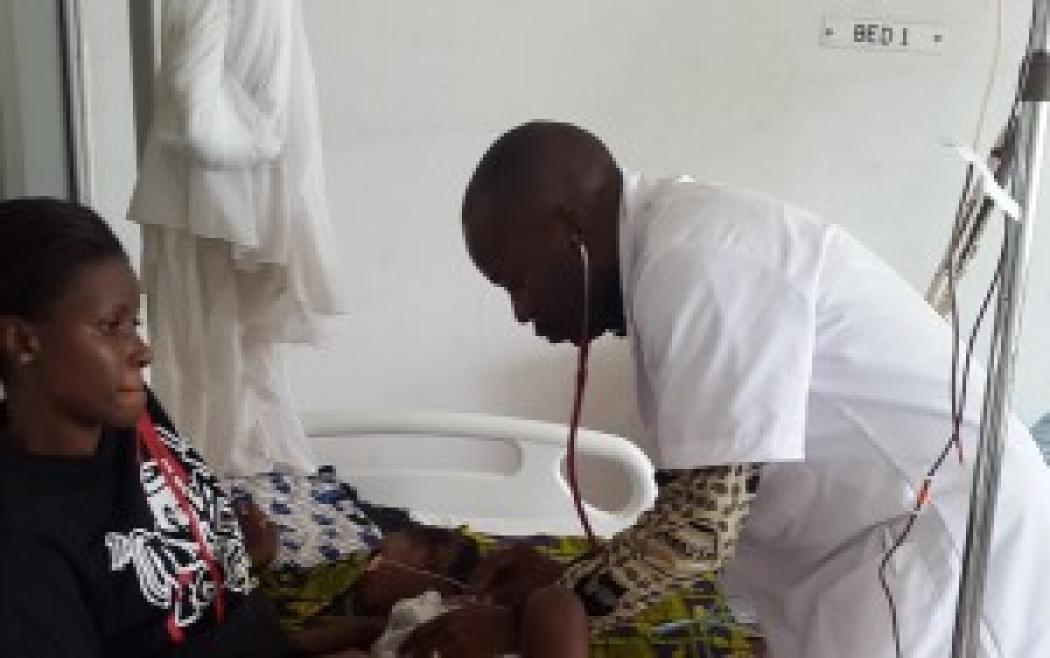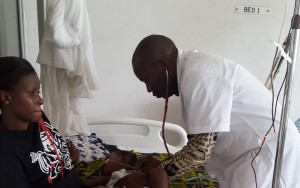A Tanzanian Pediatrician and Advocate’s Take on Tanzania’s Health Workforce and U.S. Global Health Investments

By: Scott Weathers, Frontline Health Workers Coalition, IntraHealth International
 The Frontline Health Workers Coalition recently sat down to speak with Dr. Namala Mkopi, a Tanzanian doctor, former President of the Medical Association of Tanzania, and current Vice President of the Pediatric Association of Tanzania. Dr. Mkopi has been a tireless advocate for children’s health in Tanzania and global health legislation in the United States. Our conversation has been edited for length and clarity.
The Frontline Health Workers Coalition recently sat down to speak with Dr. Namala Mkopi, a Tanzanian doctor, former President of the Medical Association of Tanzania, and current Vice President of the Pediatric Association of Tanzania. Dr. Mkopi has been a tireless advocate for children’s health in Tanzania and global health legislation in the United States. Our conversation has been edited for length and clarity.
Q: Tell us about yourself and the work you’ve done in Tanzania.
A: I am a pediatrician working for the National Hospital in Tanzania. I do some advocacy, hardcore advocacy, that is bringing it to radio and TV, hoping that you reach many people, but of course you don’t – that’s why I call it hardcore. Of course, vaccine advocacy has been one of the things that I really have passion for.
Q: What do health workers experience as they try to administer care in Tanzania? Could you talk about your experience in Tanzania about the obstacles health workers face?
Tanzania has a shortage in human resources for health. That is, there are areas in the same country where you do not have medical doctors and you have other parts of the country with specialists and consultants giving health care to patients. It’s not quite a crisis, but a big problem created internally because of the reallocation of resources. So, as a health care provider from a professional society, I’m trying to talk with the government, negotiate so that they can improve the working environments in hard to reach areas.
Most of the doctors end up staying in bigger cities and towns, because there are resources and comforts. It has a bigger impact as well. You find out patients are being mismanaged and mistreated. The right people are placed elsewhere.
As a health care provider, there are other challenges I face every day. That does not only affect service delivered to the patient, it also affects the morale of the health care provider. They don’t feel enthusiastic, they don’t feel like they can do anything to change because every other intervention that you want for a patient is not there. It creates a status quo and blunts people. They ignore things. A death of a person does not touch them. They are demotivated and not looking forward to coming back to work tomorrow.
Q: You talked about getting doctors in rural areas. What would be your solution for getting doctors out in rural areas?
The remote area is usually not attractive for the best in business. If you’re the best in the business, usually you want to live in a place that matches your status and has services like education for your family.
If you want to change, it’s not impossible, it is very possible. We’ve seen an initiative that gives doctors who are finishing graduate school internships and incentives to work in rural areas, with good salaries compared to town. They employ them, and slowly but surely, they transfer the employment from them to the government and allow them to work in different places. But salaries fall because the government pays less, so it hasn’t been sustainable.
The district is supposed to build capacity so the government facility has enough funds to make sure the doctor is well compensated and stays there.
Q: Tanzania is one of the top recipients of global health investments by United States for a variety of global health issues such as HIV/AIDS treatment or vaccines for women and children. What broader interventions do you think donors like the US could support to build stronger health systems and health workers?
We have to strengthen the system – this is not only financial muscle. It’s more than just infrastructure, it’s how to supervise and make sure that things happen according to the standard. It shouldn’t take American doctors and American medicine. I think the best plan is building capacity – so that the countries responsible can step in.
Dr. Mkopi recently visited Washington D.C. to advocate for the U.S. Congress to pass the Reach Every Mother and Child Act. Always an advocate for effective global health policies, Dr. Mkopi and his perspective was written about by the ONE Campaign and National Public Radio.
